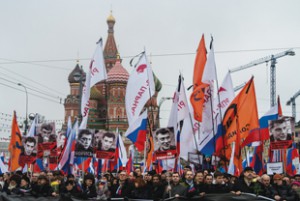On March 1, thousands of people, many of them Jewish, in protest of the murder in central Moscow of Boris Nemtsov, a former deputy prime minister. Nemtsov, an opposition leader, was gunned down on Feb. 28 just hours after he urged fellow citizens to attend a rally opposing Russia’s involvement in the war in Ukraine.
No arrests have been made in the killing, which took place on the first anniversary of Russia’s invasion of the Crimean Peninsula, which has since been annexed.
Whether or not the Kremlin ordered the killing, as some have accused, Zicer holds the Russian president responsible because of the “wild incitement he allowed on media in recent months against Nemtsov and other opposition figures.”
Kremlin spokesmen have denied any involvement in the slaying.
To many Russian Jews, the murder of Nemtsov — a physicist turned liberal politician, born to a Jewish mother but baptized in the Orthodox Church — is a troubling reminder of their vulnerability as members of a relatively affluent minority with a history of being scapegoated, strong ties to the West and a deep attachment to cosmopolitan values and human rights.
The murder hit Russia’s sizable Jewish intelligentsia particularly hard because “nearly all the leaders of the liberal opposition are either fully Jewish or have Jewish background,” said Michael Edelstein, a lecturer at Moscow State University and a writer for the Jewish monthly magazine L’chaim. “His murder is the low point in a process that started about two years ago which has left the Jewish intelligentsia and its milieu feeling more uneasy than ever before in post-communist Russia.”
To be sure, Nemtsov’s murder shocked countless Russians the world over, prompting vigils and marches in his memory. Nemtsov at one time was second in command to Putin’s predecessor, Boris Yeltsin, but ultimately was eclipsed by Putin before becoming one of his harshest critics.
In an interview conducted with Newsweek hours before his death, Nemtsov said that because of Putin’s policy, Russia’s economy is collapsing. He added that Putin’s use of media reminded him of the Nazi propaganda chief Joseph Goebbels.
Putin responded to such criticisms by referring to opponents of Russia’s actions in Ukraine as a fifth column. And though Putin did not name Nemtsov, the president was widely thought to be referring to him, the liberal camp’s most senior politician. Russian media considered to have close Kremlin ties published Nemtsov’s name on lists of suspected traitors who expressed their opposition to Russia’s annexation of Crimea in March 2014.
In a 2010 televised interview, Putin said that Nemtsov and other opposition figures stole billions from Russians and would “sell off the whole of Russia” if given the chance.
“Nemtsov was on every list of traitors published on the Internet and aired on state TV,” the Russian-Jewish journalist Leonid Bershidsky wrote on Bloomberg View after the murder. “It did not help that he was Jewish. There was a strong undercurrent of anti-Semitism in the smear campaign.”
However, some Russians doubt that Putin would go to the trouble of ordering the assassination of a high-profile figure who ultimately may be more trouble dead than alive. Nemtsov, after all, had failed to gain widespread popularity outside the urban elite and thus never constituted any real political threat to Putin.
Edelstein noted that “there may have been anti-Semitic incitement online and in far-right circles, [but] Nemtsov wasn’t perceived as a Jew and wasn’t attacked as such.”
The evidence in Nemtsov’s killing, Edelstein believes, “points to ultranationalists, perhaps militiamen who fought in Ukraine, perhaps only their sympathizers.”
Nemstov himself was open about being born to a Jewish mother and said he rarely felt any discrimination.
In a telegram he sent Nemtsov’s 87-year-old mother, Putin wrote, “Everything will be done so that the organizers and executors of this vile and cynical murder are punished.”

